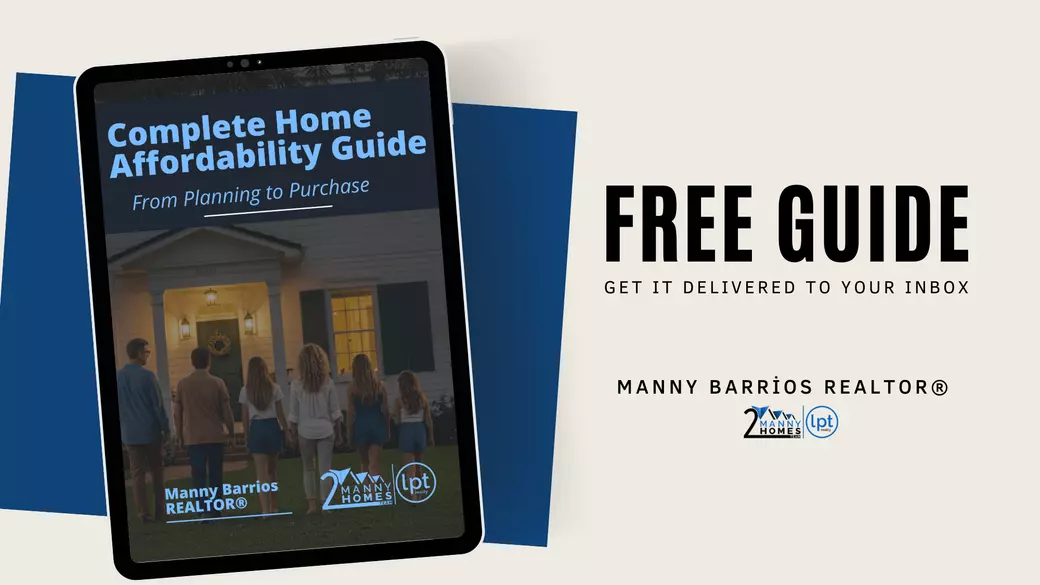How Much Home Can You Really Afford?

How Much Home Can You Really Afford? (And Why It Matters More Than You Think)
Here's a question I get all the time: "Manny, the bank says I qualify for a $400,000 loan—so I'm good, right?"
Not quite.
The truth is that getting approved for a mortgage and actually affording a home are two very different things. Banks look at numbers. But your life? That's about so much more than what fits into a debt-to-income ratio. It's about sleeping soundly at night, taking that vacation without guilt, and knowing you can handle whatever life throws at you—leaky roof and all.
If you've been wondering how to figure out what you can truly afford without stretching yourself too thin, you're in the right place. Let's walk through this together.
Why "Affordability" Isn't Just About the Loan
Affordability goes way beyond qualifying for a mortgage. It's about protecting your financial health and building wealth over time. Studies show that when housing costs exceed 30% of your income, stress levels spike—and honestly, who needs more stress?
True affordability means you can:
- Maintain a healthy emergency fund (because life happens)
- Keep contributing to retirement without skipping a beat
- Cover unexpected repairs without panic
- Still enjoy your life—dinners out, hobbies, travel
Besides, a home should enhance your life, not consume it.
Credit Health: Your Secret Weapon for Better Rates
Let's talk credit scores for a minute. The difference between "good" and "excellent" credit can save you tens of thousands of dollars. I'm not exaggerating.
Here's a real example: On a $300,000, 30-year loan:
- Credit score 760-850: 6.19% rate = $1,840/month (total interest: $362,400)
- Credit score 620-639: Could be 7.5%+ = $2,097/month (total interest: $455,000+)
That's over $90,000 more in interest just because of your credit score.
The 90-Day Credit Boost Plan
If your credit needs work, don't worry—you've got time. Here's what works:
- Pay down credit card balances below 30% utilization (below 10% is even better)
- Dispute any errors on your credit report immediately
- Don't close old accounts—credit history length matters
- Set up autopay to avoid any missed payments
The key is starting now, not later.
Understanding Your Financial Foundation
Income is obviously important, but how lenders view your income varies quite a bit:
Primary W-2 Income: The easiest to document—just provide your pay stubs and W-2s.
Commission or Bonus Income: Lenders typically need a 2-year history and will average it out. If this is you, timing matters.
Self-Employment Income: Usually requires 2 years of tax returns. Pro tip: Work with your CPA before applying—there are legitimate strategies to optimize how your income appears.
Investment Income: Dividends, rental income, and capital gains can count, but documentation is key.
The Complete Cost Breakdown (No Surprises)
Let's get real about what homeownership actually costs.
Upfront Costs
Down Payment Options:
- Conventional loans: As low as 3%
- FHA loans: 3.5% minimum
- VA loans: $0 down for qualified veterans
- USDA loans: $0 down in eligible rural areas
On a $300,000 home, that's anywhere from $0 to $9,000 at minimum (though 20% down is $60,000 if you want to avoid PMI).
Closing Costs: Expect 2-5% of the home price. On that same $300,000 home, that's $6,000-$15,000 covering:
- Loan origination fees
- Appraisal ($400-600)
- Home inspection ($300-500)
- Title insurance
- Escrow deposits
Monthly Ongoing Costs
Principal & Interest: This is your base mortgage payment.
Property Taxes: National average runs about 1.1% of home value annually—but this varies wildly by location. That's roughly $275/month on a $300,000 home.
Homeowner's Insurance: Typically $1,200-2,000/year ($100-165/month), though it depends on location and coverage.
PMI (if applicable): If you put down less than 20%, add 0.5-1% of loan amount annually.
HOA/Condo Fees: Can range from $50 to $500+ monthly—read those bylaws carefully.
Maintenance Reserve: Budget 1-2% of home value annually. Things break, and they always seem to break at the worst time.
Strategic Planning by Income Level
Let's get specific about what's realistic for your situation.
Income: $50,000-75,000/year
Home Price Range: $180,000-280,000
Monthly Housing Budget: $1,167-1,750
Your Game Plan:
- Explore first-time buyer programs and down payment assistance
- Request seller concessions for closing costs
- Consider FHA loans for lower down payment requirements
- Look at homes needing cosmetic updates (sweat equity can build wealth)
Income: $75,000-125,000/year
Home Price Range: $280,000-475,000
Monthly Housing Budget: $1,750-2,917
Your Game Plan:
- Compare conventional vs. FHA carefully (PMI costs differ)
- Consider energy-efficient homes for long-term savings
- Build in room for future income growth
- Start thinking about your next home—could this be a rental later?
Income: $125,000+/year
Home Price Range: $475,000-800,000+
Monthly Housing Budget: $2,917-5,833+
Your Game Plan:
- Integrate tax strategy with your CPA
- Consider investment properties as part of your portfolio
- Explore jumbo loan options if needed
- Don't forget—just because you can doesn't mean you should max out
Advanced Strategies That Actually Work
Rate Shopping (The Smart Way)
Get quotes from 3-5 lenders within a 14-45 day window—credit bureaus treat these as a single inquiry. Even a 0.25% difference in rate can save you thousands over the loan term.
Down Payment Optimization
The 20% Sweet Spot: No PMI, better rates, stronger negotiating position, and instant equity.
Low Down Payment Strategy: Keep cash for renovations and emergencies. Sometimes liquidity is more valuable than avoiding PMI.
Debt-to-Income Magic
Paying off a $300/month car loan could increase your home budget by $80,000-100,000. Strategic debt paydown before applying can dramatically expand your options.
Market Timing: When to Make Your Move
While you shouldn't try to perfectly time the market, awareness helps:
Economic Indicators to Watch:
- Federal Reserve announcements
- Inflation trends
- Employment data
Seasonal Considerations: October through February typically offers less competition and better negotiating power. Spring and summer? That's when everyone's house hunting, which means bidding wars.
Pitfalls That Can Derail Your Purchase
Financial Mistakes:
- Housing costs exceeding 28% of gross income (the stress isn't worth it)
- Forgetting about property tax increases
- No reserve fund for major repairs
Process Mistakes:
- Shopping for homes before getting pre-approved (heartbreak waiting to happen)
- Making major purchases during underwriting (new car = denied mortgage)
- Ignoring total monthly costs and focusing only on the mortgage
Your 90-Day Action Plan
Days 1-30: Foundation Building
- Pull your credit reports and dispute errors
- Calculate your true affordability (not just qualification)
- Start your emergency fund if you haven't already
Days 31-60: Active Preparation
- Get pre-approved with 2-3 lenders
- Assemble your team (agent, inspector, insurance agent)
- Research neighborhoods and make your must-have list
Days 61-90: Execution
- Start viewing homes strategically
- Lock your rate when it makes sense
- Stay patient—the right home is worth waiting for
Let's Make This Happen
Look, buying a home is probably the biggest financial decision you'll ever make. And it's that reason alone why you deserve to go into it with clarity, confidence, and a solid plan.
The difference between a home that builds wealth and one that creates stress? Preparation.
Ready to find out exactly how much home you can afford—and create your personalized roadmap to homeownership?
Download the Complete Home Affordability Guide for worksheets, calculators, and step-by-step planning tools.
Want to talk through your specific situation? I'd love to help. Schedule a no-pressure call with me and let's figure this out together. You can also save my contact info for easy reference.
Manny Barrios, REALTOR®
MANNY HOMES TEAM at LPT Realty
📞 407-904-5992
📧 Manny@2mannyhomes.com
🌐 2mannyhomesforsale.com
Your future home is out there. Let's find it—the smart way.
Categories
Recent Posts











